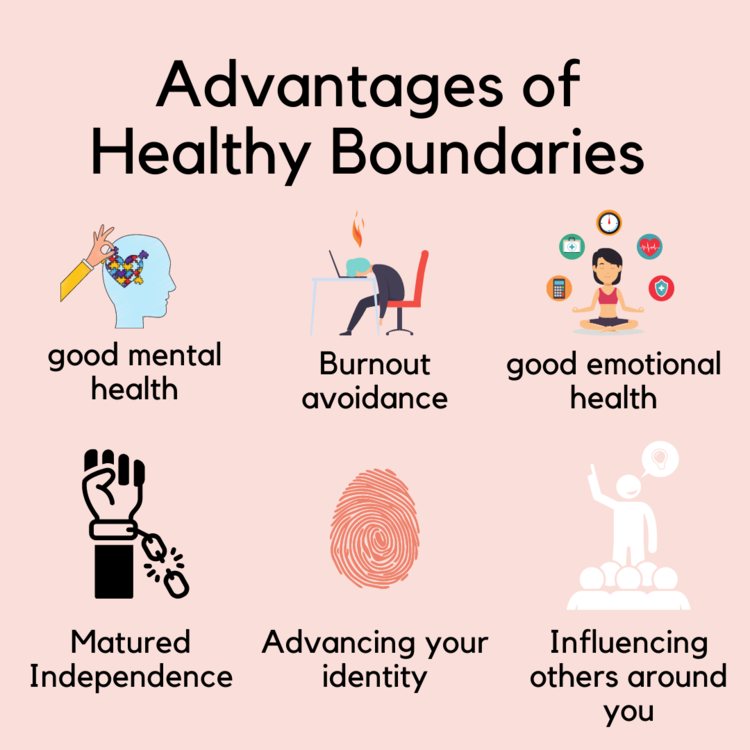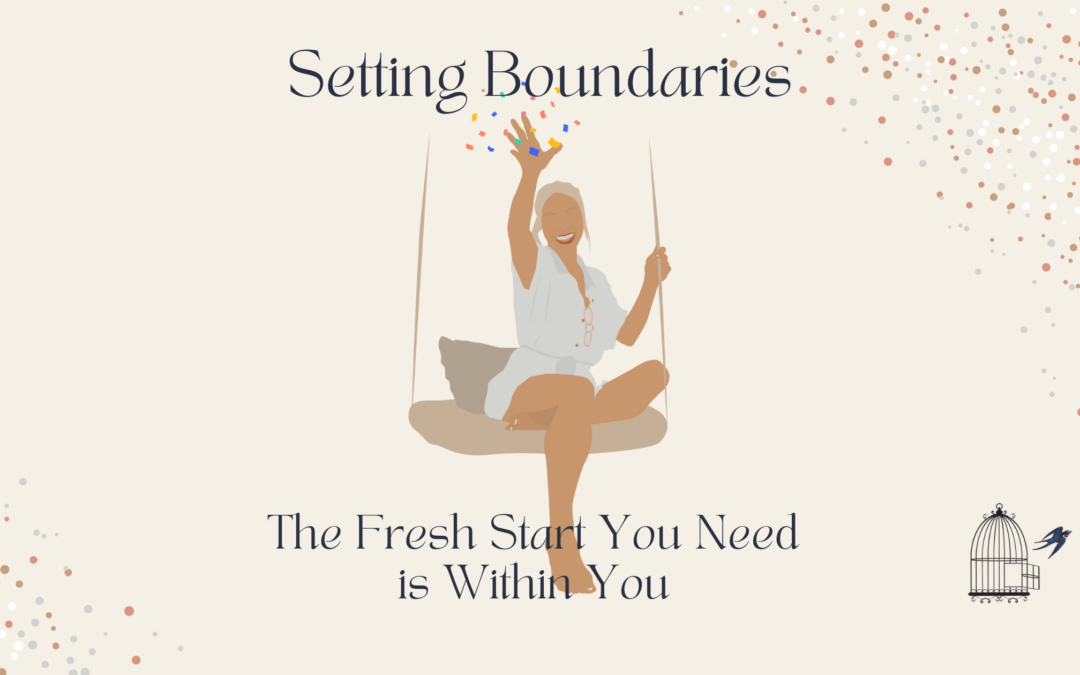Boundaries: Establishing Limits for Personal and Professional Well-being
In the whirlwind of modern life, where personal and professional spheres often blur together, establishing boundaries becomes essential for maintaining our well-being. Boundaries serve as the invisible lines that define where we end and others begin, safeguarding our time, energy, and emotional reserves.
In our relationships or the workplace, setting clear boundaries is paramount for fostering healthy interactions and ensuring personal growth. In this blog, we delve into the significance of boundaries, exploring how they contribute to our overall mental health and well-being and offering practical strategies for establishing and maintaining them.

The Importance of Boundaries:
The role of boundaries in well-being cannot be overstated; they serve as crucial safeguards for our mental, emotional, and physical health. Here’s a deeper exploration of how boundaries contribute to our overall well-being:
1. Preservation of Energy and Resources:
Boundaries act as filters, helping us allocate our energy and resources more effectively. By setting limits on where and how we invest our time and effort, we prevent exhaustion and burnout. When we establish bounds around our commitments, we ensure that we can prioritize tasks that align with our goals and values, thus preserving our vitality and preventing the depletion of our resources.
2. Protection from Harmful Influences:
Boundaries serve as protective barriers, shielding us from toxic relationships, situations, and environments. They allow us to recognize and distance ourselves from individuals who disregard our well-being or violate our rights. By establishing boundaries around what behaviors and interactions are acceptable to us, we create a safer space for personal growth and emotional healing, reducing the likelihood of experiencing harm or abuse.
3. Promotion of Self-Respect and Assertiveness:
Healthy boundaries are a manifestation of self-respect and assertiveness. When we assert our needs, preferences, and limits, we communicate to ourselves and others that we are worthy of consideration and dignity. By advocating for our boundaries, we cultivate a sense of self-worth and empowerment, fostering healthier relationships built on mutual respect and understanding. This self-advocacy contributes significantly to our overall well-being by reinforcing our sense of agency and self-esteem.
4. Reduction of Stress and Anxiety:
Boundaries play a pivotal role in mitigating stress and anxiety by providing a sense of control and predictability. When we establish clear boundaries around our time, commitments, and responsibilities, we reduce the likelihood of feeling overwhelmed or stretched too thin. By delineating what is within our sphere of influence and what lies beyond it, we cultivate a greater sense of calm and inner peace, fostering resilience in the face of life’s challenges.
5. Cultivation of Healthy Relationships:
Boundaries are essential for fostering healthy, fulfilling relationships. They facilitate honest communication, mutual understanding, and emotional intimacy by delineating the expectations and limitations of each party involved. When we respect and honor the boundaries of others, we demonstrate empathy, empathy, and compassion, laying the foundation for authentic connections based on trust and reciprocity. Healthy boundaries promote mutual growth and support within relationships, contributing to our overall sense of belonging and fulfillment.
Boundaries are not barriers to connection; rather, they are bridges to healthier, more fulfilling lives. By establishing and maintaining boundaries that prioritize our behavioral health care, we create the space for growth, self-discovery, and meaningful connections. As we learn to honor our boundaries and assert our needs, we cultivate greater resilience, self-respect, and satisfaction, ultimately enhancing our overall well-being and quality of life.

Personal Boundaries:
In our personal lives, boundaries dictate the dynamics of our relationships, influencing how we interact with family, friends, and romantic partners. They encompass various aspects, including physical, emotional, and psychological boundaries. For instance, setting limits on how much time we spend with certain individuals or articulating our comfort levels in intimate situations are examples of personal boundaries.
Strategies for Setting Personal Boundaries:
Self-awareness:
Reflect on your values, needs, and triggers to identify where to set boundaries.
Clear communication:
Express your boundaries assertively and respectfully, using “I” statements to convey your feelings and expectations.
Consistency:
Maintain consistency in upholding your boundaries, even when faced with resistance or pushback from others.
Self-care:
Prioritize self-care practices that reinforce your boundaries and protect your well-being.
Professional Boundaries:
In the workplace, boundaries delineate the scope of our responsibilities, define acceptable behaviors, and safeguard against exploitation or overextension. They involve setting limits on working hours, defining the nature of professional relationships, and establishing boundaries around communication channels.
Strategies for Establishing Professional Boundaries:
Set clear expectations:
Communicate your professional boundaries with colleagues, supervisors, and clients from the outset.
Learn to say no:
Prioritize your workload and decline tasks or commitments that exceed your capacity or fall outside your responsibilities.
Maintain work-life balance:
Establish boundaries around work hours, breaks, and vacation time to prevent burnout and promote overall well-being.
Seek support:
Consult with mentors, HR professionals, or counselors if you encounter challenges in maintaining professional boundaries.

The Role of Setting Boundaries in Well-being:
The role of setting limits in well-being cannot be overstated; they serve as crucial safeguards for our mental, emotional, and physical health. Here’s a deeper exploration of how limitations contribute to our overall well-being:
1. Boundaries Preserve of Energy and Resources:
Boundaries act as filters, helping us allocate our energy and resources more effectively. By setting limits on where and how we invest our time and effort, we prevent exhaustion and burnout. When we establish boundaries around our commitments, we ensure that we can prioritize tasks that align with our goals and values, thus preserving our vitality and preventing the depletion of our resources.
2. Protection from Harmful Influences:
Boundaries serve as protective barriers, shielding us from toxic relationships, situations, and environments. They allow us to recognize and distance ourselves from individuals who disregard our well-being or violate our rights. By establishing limits around what behaviors and interactions are acceptable to us, we create a safer space for personal growth and emotional healing, reducing the likelihood of experiencing harm or abuse.
3. Promotion of Self-Respect and Assertiveness:
Healthy limitations are a manifestation of self-respect and assertiveness. When we assert our needs, preferences, and limits, we communicate to ourselves and others that we are worthy of consideration and dignity. By advocating for our bounds, we cultivate a sense of self-worth and empowerment, fostering healthier relationships built on mutual respect and understanding. This self-advocacy contributes significantly to our overall well-being by reinforcing our sense of agency and self-esteem.
4. Reduction of Stress and Anxiety:
Boundaries play a pivotal role in mitigating stress and anxiety by providing a sense of control and predictability. When we establish clear bounds around our time, commitments, and responsibilities, we reduce the likelihood of feeling overwhelmed or stretched too thin. By delineating what is within our sphere of influence and what lies beyond it, we cultivate a greater sense of calm and inner peace, fostering resilience in the face of life’s challenges.
5. Boundaries Cultivate Healthy Relationships:
Boundaries are essential for fostering healthy, fulfilling relationships. They facilitate honest communication, mutual understanding, and emotional intimacy by delineating the expectations and limitations of each party involved. When we respect and honor the boundaries of others, we demonstrate empathy, empathy, and compassion, laying the foundation for authentic connections based on trust and reciprocity. Healthy boundaries promote mutual growth and support within relationships, contributing to our overall sense of belonging and fulfillment.
Conclusion:
In a world characterized by constant connectivity and demands, establishing boundaries is not only a choice but a necessity for preserving our well-being. Whether in our relationships or within the workplace, bounds serve as the cornerstone of healthy interactions, fostering respect, understanding, and mutual growth. You can visit this website to learn how to set personal boundaries in an animated video.
Boundaries are not barriers to connection; rather, they are bridges to healthier, more fulfilling lives. By establishing and maintaining limits that prioritize our well-being, we create the space for growth, self-discovery, and meaningful connections. As we learn to honor our limits and assert our needs, we cultivate greater resilience, self-respect, and satisfaction, ultimately enhancing our overall well-being and quality of life.
By embracing the practice of setting and maintaining limits, we empower ourselves to lead more balanced, fulfilling lives, where our needs are honored, and our potential is maximized.
